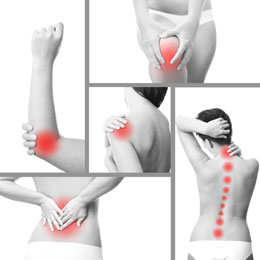Joint pain can be extremely troublesome, and it usually increases with age. There are prescription drugs that provide relief from pain; however, prolonged use of these drugs can cause certain side effects. This article provides information regarding supplements that can help alleviate the symptoms of inflamed joints.

Arthritis is the most common cause of joint pain. However, there could be several other causes such as bursitis, tendonitis, gout, osteomyelitis, osteopenia, etc. Though there are many treatment options for relieving the pain, the use of supplements is preferred, as they fulfill the body's requirements of nutrients, thereby improving the condition of cartilage and bones.
Supplements
These supplements help relieve the pain and also rebuild the damaged cells to prevent pain in the future. Although it is not possible for any supplement to repair the damage completely, it should be able to reduce the inflammation of the joints and provide comfort to the patient.
Glucosamine Sulfate
It is necessary to maintain the proper level of moisture within the cartilage, as the cartilage loses elasticity due to the absence of moisture, and is unable to absorb the impact caused during walking, running, and other activities. Glucosamine is an amino acid that is produced naturally in the body. It strengthens the cartilage, thereby preventing pain. It plays a significant role in the repair of the cartilage. Glucosamine supplements are effective in reducing the inflammation and joint pain, as these help increase the rate of formation of new cartilage.
Hyaluronic Acid
Hyaluronic acid is a naturally-occurring polymer, which is present in the synovial joint fluid. It serves as a cushion for the joints by creating a viscous and protective environment for the joints. It keeps the joints lubricated throughout, and thus reduces the pain caused by friction. Absence of this acid stiffens the joints, thereby causing severe pain during movement. Hyaluronic acid supplements are known to reduce this pain.
Chondroitin Sulfate
Chondroitin is another naturally-occurring compound present in our body that is partly responsible for the resilience of the cartilage. It is essential for the formation of the matrix structure of the joints. Chondroitin supplements are used in conjunction with glucosamine sulfate, and are effective in alleviating the joint pain.
S-adenosylmethionine
S-adenosylmethionine or SAMe helps in increasing the number of chondrocytes or cartilage cells, thereby increasing the thickness of the cartilage. Though it is a natural remedy for depression, it is also known to ease joint pain associated with arthritis. This supplement improves the amount of collagen produced (resulting in strengthening the joints) and also possesses anti-inflammatory properties.
Methylsulfonylmethane (MSM)
MSM is believed to support ligaments, and is believed to be quite effective in treating osteoarthritis. It is naturally found in cow's milk, seafood, meat, fruits, and vegetables. It is also available in the form of capsules, tablets, and lotions.
Vitamins
Vitamins like niacinamide (form of B3) and vitamin D are very effective in relieving the pain associated with osteoarthritis. Vitamin D controls the deterioration of cartilage in the joints and helps in combating the pain. Research has proved that niacinamide is effective in improving the flexibility of the joints and reducing inflammation.
Ginger
Ginger is famous for its anti-inflammatory properties. It inhibits COX (an enzyme responsible for causing pain and inflammation) and lipoxygenase, and also decreases the production of prostaglandins which cause inflammation. It's known to reduce moderate joint pain.
Turmeric
Turmeric, apart from its culinary properties, has the power to alleviate pain and reduce the inflammation. It contains curcumin, which inhibits COX-2, prostaglandins, and leukotrienes, thus preventing or reducing inflammation.
People who are on anticoagulants (blood-thinning medications) or undergoing surgery should use turmeric and ginger only if approved by the medical practitioner, as otherwise there is a risk of bleeding.
Even though the supplements could be preferred over the drugs, you would need to consult the medical practitioner before consuming them, as there can be adverse drug interactions, allergy problems, or harmful side effects. Also, make sure that you follow an anti-inflammatory diet and perform regular exercises (including weight-bearing routines and walking).
Disclaimer:
This Buzzle article is for informative purposes only, and should not be used as a replacement for expert medical advice.


 Arthritis is the most common cause of joint pain. However, there could be several other causes such as bursitis, tendonitis, gout, osteomyelitis, osteopenia, etc. Though there are many treatment options for relieving the pain, the use of supplements is preferred, as they fulfill the body's requirements of nutrients, thereby improving the condition of cartilage and bones.
Arthritis is the most common cause of joint pain. However, there could be several other causes such as bursitis, tendonitis, gout, osteomyelitis, osteopenia, etc. Though there are many treatment options for relieving the pain, the use of supplements is preferred, as they fulfill the body's requirements of nutrients, thereby improving the condition of cartilage and bones.